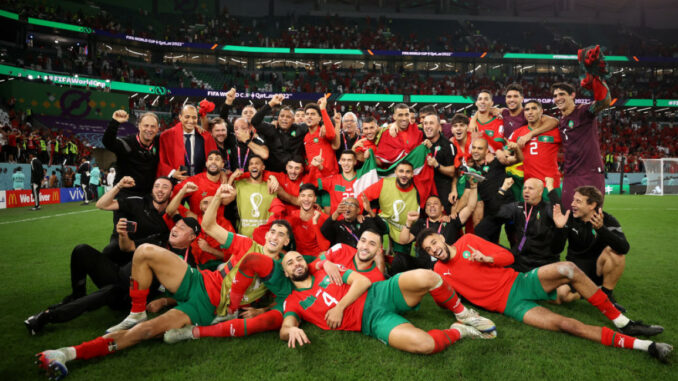
During the recent World Cup in Qatar, Morocco not only left a lasting impression with its brilliant performance on the field but also solidified its position as a key player within the governing bodies of world football, according to an article from radiofrance.fr titled “Sports Diplomacy.” The kingdom achieved two major diplomatic successes by being entrusted with hosting the 2025 Africa Cup of Nations and co-hosting the 2030 World Cup.
According to analyses by Yassine El Yattioui, a Ph.D. candidate in political science at the University of Salamanca and the Secretary-General of the Nej Maroc think tank, Abderrahim Bourkia, a researcher at Hassan 1st University and a professor of sociology of sport at the Institute of Sports Sciences in Settat, and Amina Azmi, a researcher at the Prospective Research Laboratory in Finance and Management at Hassan II University in Casablanca, Morocco is asserting itself significantly on the sports and diplomatic stage.
On December 6, 2022, on the outskirts of Doha, Moroccan goalkeeper Yassine Bono captivated the football world by stopping a Spanish penalty kick. In the aftermath, his teammate Achraf Hakimi converted his own, propelling their country into the quarter-finals of the World Cup. The enthusiastic cheers of thousands of supporters echoed around the world, from Rabat, Casablanca, and Marrakech to Brussels, Paris, Amman, and Accra.
This Moroccan team not only embodies the pride of the kingdom’s citizens but also symbolizes the unity of the diaspora, the Arab-Muslim world, and Africa. The successes on the field are accompanied by political victories won behind the scenes by Morocco within the African and global football institutions. Recently, the kingdom was designated as the host for the 2025 Africa Cup of Nations and co-host for the 2030 World Cup, receiving support from African federations, notably due to the trust earned by Fouzi Lakjaâ, the leader of Moroccan football.
